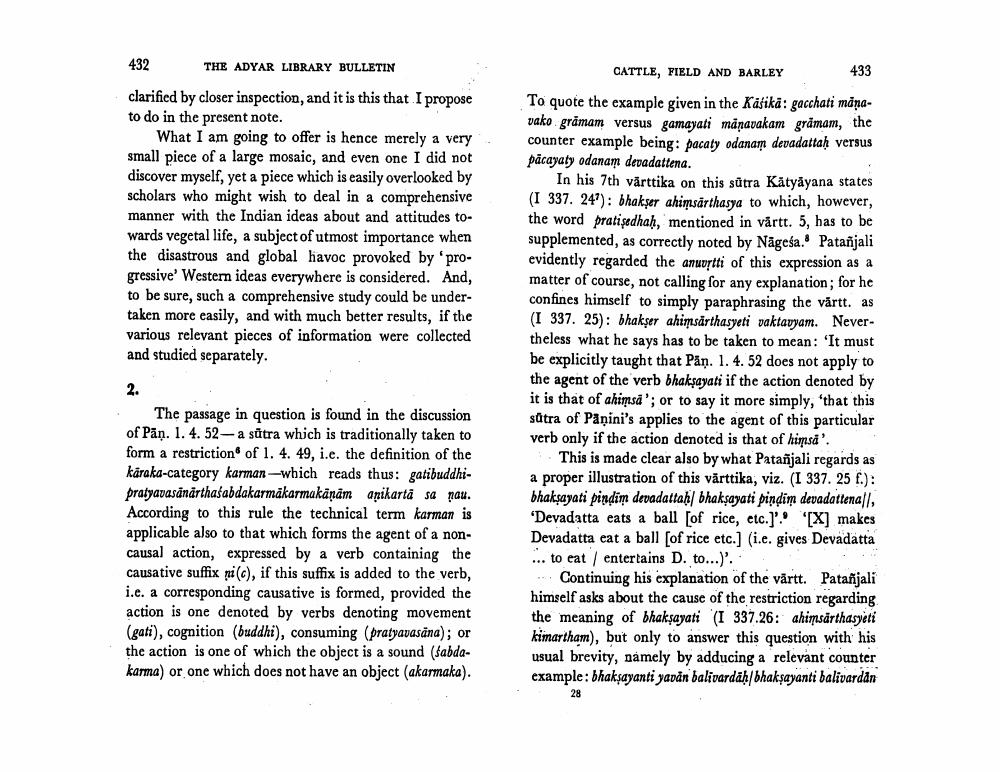Book Title: Cattle Field And Barley Note On Mahabhasya Author(s): A Wezler Publisher: A Wezler View full book textPage 2
________________ 432 THE ADYAR LIBRARY BULLETIN CATTLE, FIELD AND BARLEY 433 clarified by closer inspection, and it is this that I propose to do in the present note. What I am going to offer is hence merely a very small piece of a large mosaic, and even one I did not discover myself, yet a piece which is easily overlooked by scholars who might wish to deal in a comprehensive manner with the Indian ideas about and attitudes towards vegetal life, a subject of utmost importance when the disastrous and global havoc provoked by 'progressive' Western ideas everywhere is considered. And, to be sure, such a comprehensive study could be undertaken more easily, and with much better results, if the various relevant pieces of information were collected and studied separately. To quote the example given in the Käsikä: gacchati māņavako grāmam versus gamayati manavakam gråmam, the counter example being: pacaty odanam devadattah versus păcayaty odanam devadattena. In his 7th värttika on this sūtra Kätyāyana states (I 337. 247): bhakşer ahimsarthasya to which, however, the word pratisedhah, mentioned in vårtt. 5, has to be supplemented, as correctly noted by Nägesa. Patanjali evidently regarded the anuutti of this expression as a matter of course, not calling for any explanation; for hc confines himself to simply paraphrasing the vartt. as (I 337. 25): bhakşer ahimsarthasyeti vaktavyam. Nevertheless what he says has to be taken to mean: 'It must be explicitly taught that Pån. 1. 4. 52 does not apply to the agent of the verb bhakşayati if the action denoted by it is that of ahimsa'; or to say it more simply, 'that this sutra of Pāņini's applies to the agent of this particular verb only if the action denoted is that of himsa'. This is made clear also by what Patañjali regards as a proper illustration of this värttika, viz. (1 337. 25 f.): bhakşayati pindim devadattah bhakşayati pindim devadattenall, 'Devadatta eats a ball [of rice, etc.)'' '[X] makes Devadatta eat a ball [of rice etc.) (i.e. gives Devadatta ... to eat /entertains D. to...)'. Continuing his explanation of the värtt. Patanjali himself asks about the cause of the restriction regarding the meaning of bhakşayati (I 337.26: ahimsarthasyeti kimartham), but only to answer this question with his usual brevity, namely by adducing a relevant counter example: bhakşayanti yapan balivardah/bhakşayanti balivardan The passage in question is found in the discussion of Pāņ. 1. 4. 52- a sútra which is traditionally taken to form a restriction of 1. 4. 49, i.e. the definition of the karaka-category karman-which reads thus: gatibuddhipratyavasånärthasabdakarmakarmakanam anikarta sa pau. According to this rule the technical term karman is applicable also to that which forms the agent of a noncausal action, expressed by a verb containing the causative suffix ni (c), if this suffix is added to the verb, i.e. a corresponding causative is formed, provided the action is one denoted by verbs denoting movement (gati), cognition (buddhi), consuming (pratyavasana); or the action is one of which the object is a sound (Sabdakarma) or one which does not have an object (akarmaka). 28Page Navigation
1 2 3 4 5 6 7 8 9 10 11 12 13 14 15 16 17 18 19 20 21 22 ... 24
